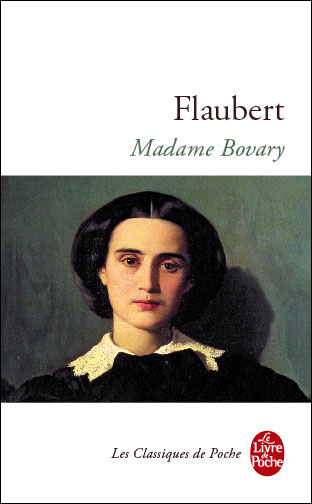Unfortunately for the majority of us, we spend four years of high school in English classes reading the "classics." However, they didn't have enough time to make us read all of the classics. One of the classics that I never had to read is Madame Bovary by Gustave Flaubert. Well... I haven't had to read it until about a month ago. Three books in four weeks. Flaubert has haunted me for the past month. While reading his work in English would probably be cake, I am reading it in French (French class = French version). The majority of the words and phrases he uses in his descriptions no longer apply to the modern French language.
The biggest struggle I have had in reading this epic novel is interpreting Emma Bovary. It's harder, still, to find the place of Charles Bovary in relation to Emma. Does she love him? Did she ever love him? It's very simple to see that Charles loves her, but to what extent? Is it really love? What about her affairs, as well?
Emma Bovary, born to a family living in the countryside, has always sought adventure and romance. She yearns for mystery and intrigue, purpose and desire. All of these things she wants, Charles cannot provide. He's a simple man and enjoys little things. He isn't imaginative or brilliant. Charles Bovary is used to be pushed around and loved to be controlled by women. His mother did this all of his life, ensuring he got into the schools he needed to get into, finding him second chances to take important tests, and securing his first job in Tostes. She even went as far as to select his bride, an almost identical personality to that of Madame Bovary mère. Although a doctor might make women take a second glance today, Emma Bovary does not care in the slightest about doctors. She wants to me treated and charmed every second of her life. While her life with Charles may have begun this way, it certainly does not remain that way for long.
Perhaps Flaubert is saying something important about the relationship between a man and a woman. He offers little vignettes of married life between two people who do not love each other many times. For instance, there is a section in the first part of the story where the two have been invited to a ball held by the Marquis. When getting ready for the dance, Charles attempts to be affectionate towards Emma by kissing her shoulder. She refuses and tells him to leave her alone. There are many other instances where she tells him how simple he is (i.e. throwing out her marriage bouquet as a symbol of her rejection of the marriage). Flaubert, I think, is pointing out something about a woman's heart. Some women want romance and chivalry without seeing the love and affection given them on various occasions. Perhaps Flaubert is telling us all to keep our feet firmly planted to the ground and realize that constantly chasing romance can cause catastrophe (e.g. Emma's suicide). We have to be happy with the things we already have and be resourceful. Constantly worrying about what we don't have hurts worse than focusing on what we do have.
Hats off to Flaubert for one of the most masterful works of realism and prose in the French language. I have never in all of my life been more impressed with a book. If you don't believe me, pick up a copy and find out for yourself who Emma Bovary is and what Flaubert teaches us about life and love. You won't be disappointed.

